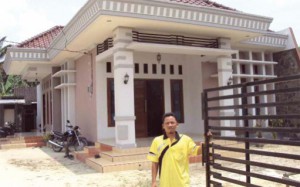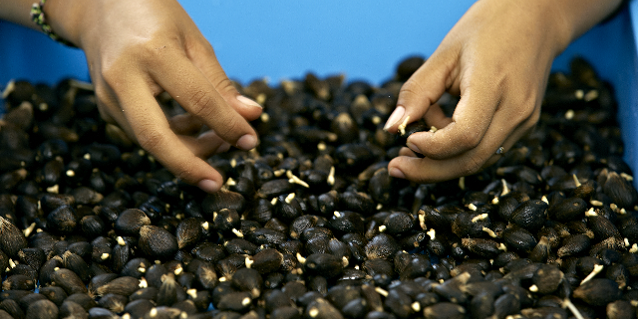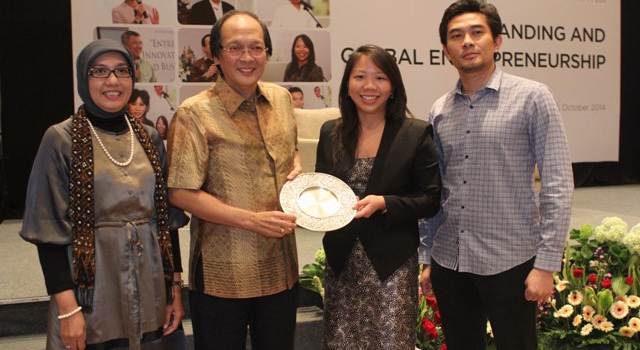For its work in improving the economic and social well-being of palm oil smallholders, Asian Agri has been in the media spotlight recently. Three articles in the Jakarta Post covered the work done by the palm oil company, one of the pioneer corporate partners in the Plasma programme.
The Plasma programme was an initiative by the Indonesian government to ensure transmigrated communities could leverage their relationship with corporate partners to sustainably manage their plantations.
As part of a national policy to address population distribution, selected communities were relocated from the Java to the less densely populated outer islands via transmigration. The involvement of corporate partners helped establish skills, infrastructure and improve social and economic standards of these communities.
Creating shared value for all
Asian Agri’s resources, expertise and socially-aware business direction helped catalyse the economic and social development of smallholder communities, raising living standards while continuing to optimise palm oil yield.
Both parties tap on the partnership to create shared value, which sees a boost in the company’s competitive edge while at the same time raises social and economic conditions of communities living around its areas of operation.
Asian Agri’s smallholder community-focused initiatives and programmes helped arrest productivity challenges in poor fertiliser, cultivation techniques, limited access to pesticides and poor farming discipline.
Because of Asian Agri’s ability and success in redefining and re-managing productivity in the value chain, in addition the creation of a supportive business environment, the company and its partners are able to create share value. (Ref: Improving livelihoods of smallholders through partnership)
Siswoyo: A smallholder story of perseverance and success

Siswoyo at his house. The palm oil smallholder enjoys better living standards after being a partner with one of Asian Agri’s business units. (Image source: The Jakarta Post)
Siswoyo is one of many smallholders who benefitted from the partnership with Asian Agri. (Ref: Siswoyo regrets not buying more land)
After learning of the success stories of palm oil farmers, the inexperienced and unskilled Siswoyo decided to become an independent smallholder in Ukui in 1996. Ukui was one of the popular plantation areas in Riau.
He purchased a two-hectare site there. However, he faced challenges such as adjusting to life as a farmer, the lack of knowledge in cultivating oil palm, timely access to fertiliser and raising the productivity of his plantation.
He eventually joined a cooperative and later became an assisted partner of PT Inti Indosawit Subir, a business unit of Asian Agri. With the partnership and his perseverance, his business and life started to change for the better.
Leveling the playing field
Asian Agri’s business unit helped the likes of Siswoyo, leveling the playing field for him. He acquired the necessary skills and knowledge in fertilisation, plantation management, and delivery of fresh fruit bunches.
He said, “The clear thing is the company will help us find solutions to any problem we face in our plantations.”
Asian Agri’s R&D, expertise and guidance eventually helped Siswoyo increase plantation productivity, which saw its yield double. He even obtained RSPO (Roundtable Sustainable Palm Oil) certification and purchased an additional two hectares to expand his plantation.
In his interview, he noted that he should have, on hindsight, bought more land prior to 2000 when prices were lower. He still remained optimistic and expressed hope to perform the Haj pilgrimage with his wife in 2017.
The future looks bright for Siswoyo, who used to live in a small wooden hut for over a decade. That hut is now a warehouse, and it sits next to a concrete house, in which Siswoyo lives with his wife and two children.
Sowing the (high-yield) seeds for a sustainable future
Driven by the need to remain competitive and sustainable, Asian Agri continues to embody the forward-looking character of its founder Sukanto Tanoto, a noted visionary business leader and philanthropist. It wants to involve more local farmers and use high-yield oil palm seeds to raise crude palm oil production. (Ref: Asian Agri to involve more farmers in CPO production)
Asian Agri was one of the pioneering companies to have involved plasma and independent farmers in its plantations in Sumatra for almost three decades.
Today, it seeks to optimise the yield from its existing oil palm plantation land via a multi-prong approach that includes active farming community engagement, use of high-yield oil palm seeds and increasing the management of its plantation area by plasma farmers from 40 percent to 60 percent. In addition, the company also plans to engage more independent farmers for crude palm oil.
With long-term mutually beneficial relationships fostered with plasma and independent farmers, and a strong focus on science and technology as a means to sustainability and competitive advantage, Asian Agri continues to do what it believes to be good for the community, the country and the company.
About Asian Agri
Asian Agri is an Indonesian-based, world-class palm oil company that manages the archipelago’s abundant natural resources. It was established in 1979.
Asian Agri was one of the pioneers in the Indonesian government’s transmigration scheme in Riau and Jambi. The scheme involved the migration of Indonesians from densely populated areas of Indonesia, such as Java, to less populous areas of the country with the objective of reducing poverty. Under the scheme, migrants were given land. In partnership with companies like Asian Agri which provided training in palm oil cultivation, seedlings, financing and community services, these migrants became successful smallholders, supplying their palm oil produce to Asian Agri at fair trade prices in line with government policy.
Asian Agri is part of a group of companies managed by RGE, which is founded by Sukanto Tanoto, also its chairman.







